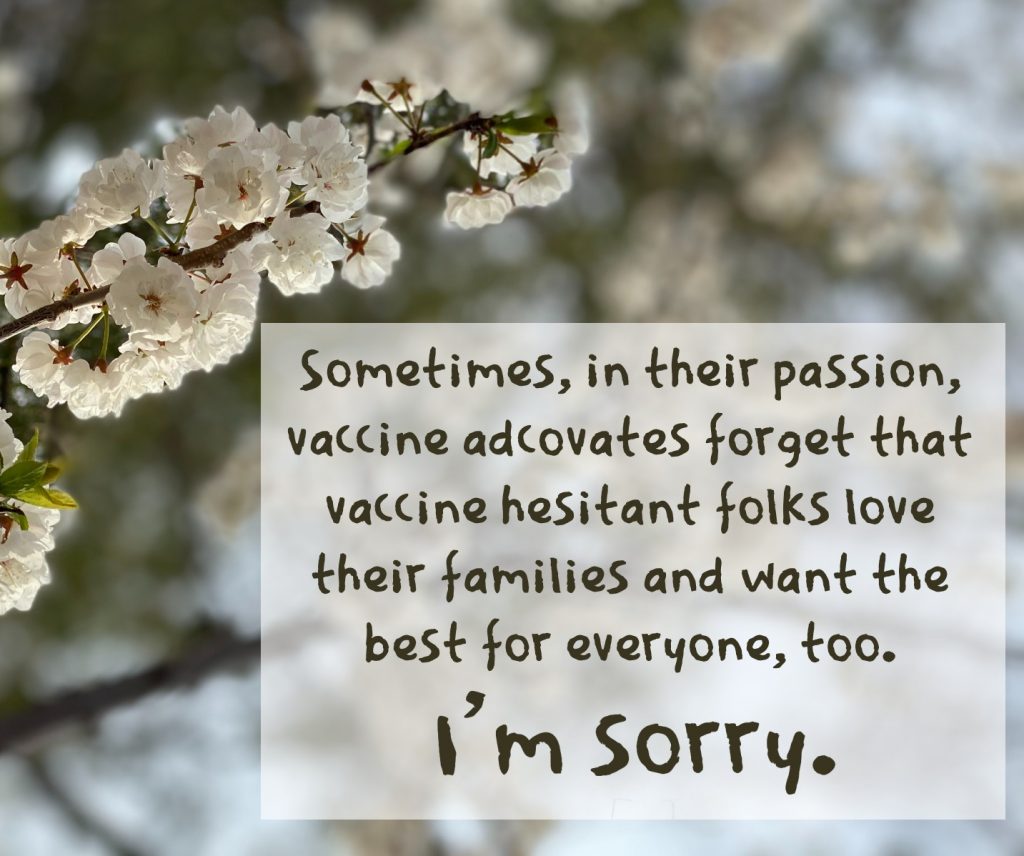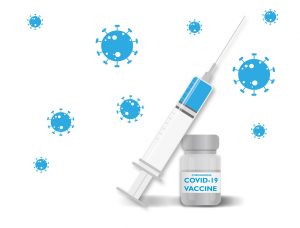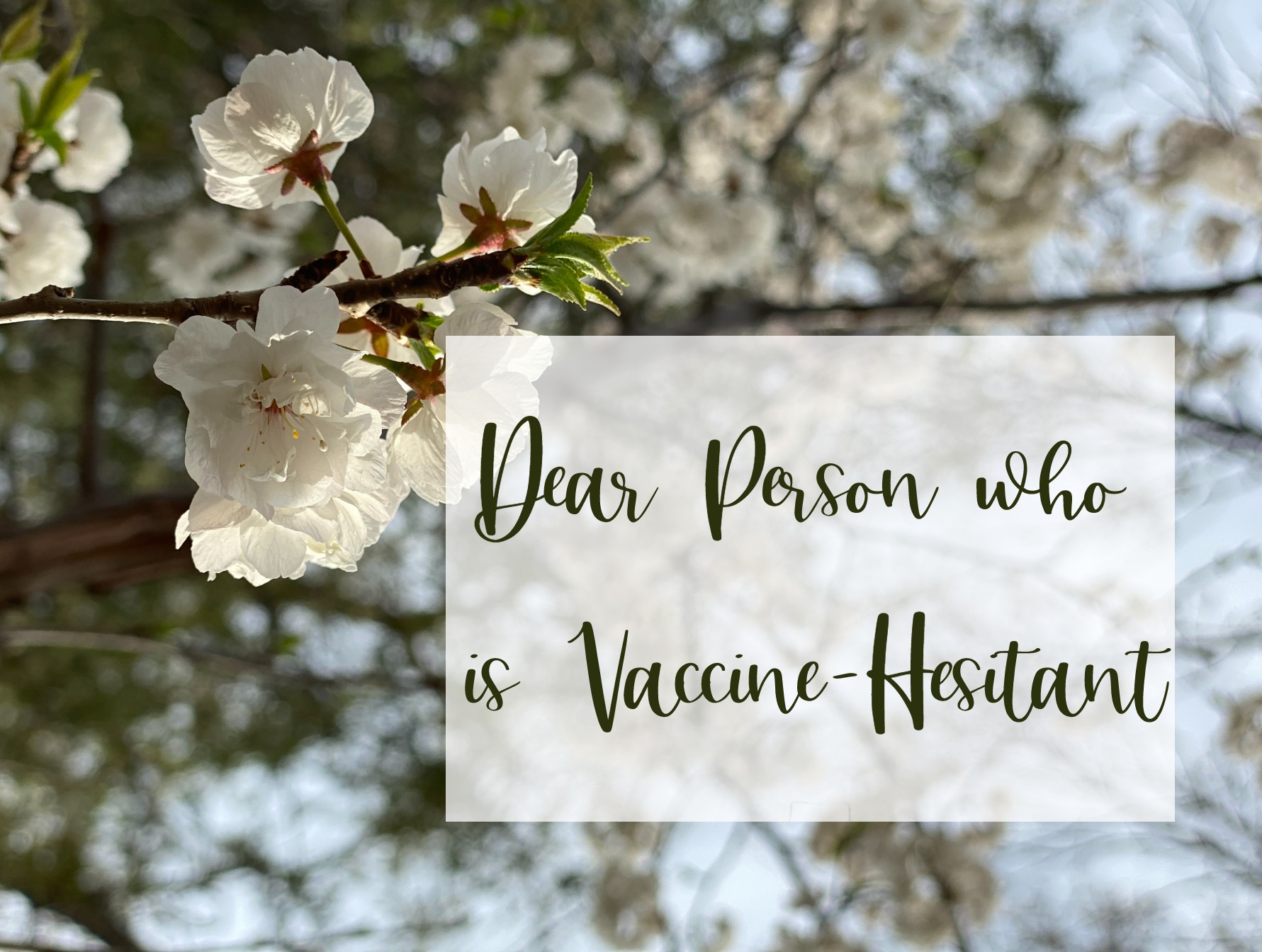Dear Friend,
If you and I were meeting together, we’d sit and have a cup of tea. We would exchange information. I love stories, and I would want to hear yours–about the frustrations and disappointments you’ve had over the last year, about some unexpected moments of joy, about your family–just generally, about how you came to be you.
However, this is a letter–which by its very nature, isn’t easily given to two way conversation. 😉 This conversation, therefore, might feel a little one-sided–but please know I’d love to hear you in the comments below. Or write me an email. I promise I’ll read it.
You’ll notice the title of my letter: Dear Person who is Vaccine Hesitant. You are a person first–one with talents, interests, beliefs, challenges, wounds, strengths and victories. You are so much more than you hesitancy (or refusal) for a vaccine.
Sometimes, us vaccine-enthusiasts can forget that–and we treat you as the enemy. Not cool. In our passion and fear, we caricature you in our minds in ways that reduce you to a single decision. I’m sorry. Not cool. Not respectful.
We forget that you love your family and that you want the best–just like the rest of us.

We forget that you have the same dreams for goodness and success of your children, the same desire for health, the same desire to have this planet do well–and you just come out at a different place when it comes to the strategies to achieve that.
You’ve likely had some very heated conversations with your cousin or colleague or neighbour that you have experienced as disrespectful, hurtful, or even hateful. Maybe they have tried to strong arm you into getting the vaccine. I will admit, it’s hard to have effective, calm and connected conversations when there are big feelings–and feelings are rarely bigger than around life and death issues.
And the issue of vaccines is life and death. Our ICU’s in Manitoba are bursting. Most of us know either someone directly that has died from COVID-19 or is grieving a loved one who has died from COVID-19.
Most of us know someone waiting for important tests or surgery that as been postponed because of COVID-19. We also know people who have lost their businesses or their jobs or are experiencing economic devastation from the effects of pandemic restrictions. It feels life and death when you’re not sure how to feed your family or keep a roof over their head!
You and I also are experiencing the expectation from government that we not visit with people outside our homes. We are not to attend places of worship–something that is essential to the spiritual well being of many of us. We can’t sit in restaurants or movie theatres. It’s really hard–and feels like such a violation. When we can’t connect with our friends and family, that hardship starts to feel like death.
We are told what we can do and what we can’t do. And so–when officials tell us that we are to receive an injection in our arm–that can feel like one thing too dang much.
“Don’t tell me what to do. I am in charge of my own body.”
As a therapist who works to empower people, I get that. The feeling of powerlessness is one that all of us hate. Our bodies are something we truly call our own–and when “the system” expects us to inject a substance into it, it feels invasive.
Intrusive. And violating.
For reals.
However, I want to share with you my own experience. The first day I was eligible, I eagerly and cheerfully made an appointment for a vaccine.
I wanted the vaccine–probably for similar reasons that you don’t want it.
I made the decision I did because I want what is best for my family. Because I care. In this big and scary world, I want to make the best decisions that I can.
You too?
I arrived at the “get vaccinated” decision because of my research, discussions, thoughts, and faith. It is my faith–my theology which has informed my decision. My years of teaching at the university shaped my conclusion. My understanding of faith, vulnerability, fear, love shaped by years of deep and meaningful conversations with clients helped determine that choice.
Maybe grab a cup of coffee and listen to my story. I’ll just share about why I chose to get my shot in the arm of the vaccine. I arrived at this through my lens of history, joys, brokenness, victories and sorrows.
I examined the evidence, carefully
For many years, I taught at the University if Manitoba. We were careful to teach what the evidence said, through research that was done by colleagues all over the world. We didn’t want to just teach what “felt right” intuitively. Quack medicine men have been made rich off of intuitive medicine that has no impact at best–and sometimes incredibly harmful at worst.
The thing is this: you can always find somebody that says what you want to hear.
Doesn’t mean it’s always valid.
My husband is a carpenter. When he gives a quote to a potential customer, he’s had people say, “I got a quote for half the amount you are going to charge me.”
They let him know that because he charges a fair market cost, the cheaper guy makes him look greedy and over-pricey.
My husband shakes his head as he walks away–because anyone that is charging half of what he is is running a scam. The ones who give low-ball quotes are either clueless about costs–which means they are likely clueless about construction OR the final cost will be very different than the quote–they will upcharge the customer in an ambush. The original cost the unrealistic carpenter told the customer what they wanted to hear, rather than the actual, reasonable cost of a well built project.
During times of crisis, we will always be able to find:
- a scientist who is an outlier–someone who believes the opposite of 98% of the colleagues in his profession
- someone who took a course once
- someone who doesn’t have an education but because they have a big audience and deep voice
…who will say what we need them to hear.
It’s human nature for us to look for people who will convince us that we don’t have to be scared, by telling us things that will make us feel better.
They will help us feel less scared, more certain by believing them and the conviction they have that vaccines are unnecessary and that, by staying away, we will be safer.
I reviewed why vaccines are important and have processes to maximize safety. I looked to illnesses like polio and the effect that vaccines had on them. Vaccines have essentially eradicated polio I used to work with polio survivors–they were all adults who had it many many years ago. . I never worked with a polio survivor under 40, even 2 decades ago. Vaccines have made a difference in our world
I looked to understand why the vaccine could be developed so quickly and still be safe. Turns out previous vaccine research has gotten the foundations ready for quick development. (Kind of like me making a cake for the first time–but it is actually the one I’ve made for years–just with nuts in it and a different flavour of icing. It’s a new cake, but I’ve been baking the basic recipe for that cake for decades.)
I wanted to make sure that my mom wouldn’t get COVID-19 from the COVID vaccine–she couldn’t.
When I would see or hear a concern, I would research it. I would check broader sources, and check the reputation of the sources. Some concerns have been thoroughly fact checked and debunked. I’ve checked those concerns from multiple sources. I talked to my doctor’s office.
A lot of us don’t like needles–or our reaction to them

One of my co-teachers used to tell a story of a phone call she had with her mom. She called her mom to ask her to look after one son. When she explained that she needed to take her other son to the hospital for stitches because he was bleeding badly from a gash, she heard a loud “clunk” and then nothing.
Her mother had fainted. Some people faint at the sight of blood. Some people faint at the thought of someone bleeding.
And some faint with a vaccine. It’s a needle going into our body. Face it, needles are uncomfortable and make many of us squeamish. (It’s not abnormal, and it’s not dangerous–but it doesn’t seem right, does it?)
And that’s vulnerable, isn’t it?
No one wants to get lightheaded amongst strangers, or worse yet, lose consciousness.
It can feel embarrassing–even humiliating. Before one gets the vaccine, a person just doesn’t know if they will be ok. And for some, that might be enough reason to come up with enough reasons to avoid it all together.
Fainting isn’t just potentially embarrassing–it also seems scary. It’s hard to believe that it is a normal reaction to the stressful situation of needles.
Another one of my former colleagues from U of M has trained to work at the vaccine sites. She posted this the other day on her facebook:
My colleagues and I have spent this last week holding many hands of young adults who were anxious while getting the vaccine or who get dizzy/faint with needles. Almost all have apologized for “being so much trouble”. To everyone out there getting the vaccine who is scared or anxious or who hates needles: you are not too much trouble! We are here to help you, and you are being brave and responsible doing this in the face of your fears! We will hold anyone’s hand who needs it!
Natalie MacLeod Schroeder
I was struck by the compassion of the vaccination team–and by their insightful wisdom.
Courage isn’t appearing bullet-proof and staying strong by staying away–courage is being brave while feeling fear and doing it anyway. Courage is risking fainting in the eyes of the vaccinators.
Natalie went on to say:
We have seen a lot of people who are reluctant for this (or any!) vaccine. You will know all of this, knowing who you are
Natalie MacLeod SchroederWhen I have had some one resistant or hesitant, the best approach has been to listen. Where are their concerns coming from? What is their fear? And then just answer their questions as honestly as we can. We often will take them to a private space so they can just take their time to think and get their questions answered. There is a lot of information and misinformation out there and we do our best to give them the best information we have. We also won’t immunize someone who doesn’t want it or is undecided. We have deferred some who have come through the door so they can take their own time. We hope to see them again, but want them comfortable with their decision.
The fundamental respect by the vaccination team of a person’s right to choose is remarkable. While she is confident in her ability to inform people, theuy don’t coerce or force people to get the needle.
I like knowing that anyone can make a vaccination appointment without being convinced that they will get the vaccine. They can attend that appointment to ask their questions, express their concerns, and make a thoughtful decision at the appointment. The vaccination team EXPECTS people to voice their concerns.
Dear Person who is hesitant to get a vaccine,
Well, your cup of tea is empty by now. Time for us to get on with our days, eh?
I’ve written enough–and yet, I think we have more to talk about.
It’s quite possible your vaccine concerns arise out of your faith in God. Depending on a vaccine may be a sign of lack of faith. Listening to officials that tell you to go get vaccinated may seem like you are not being loyal to your church leaders who discourage it.
Getting the vaccine perhaps can feel like it violates the religious freedoms that your great-grandparents, grandparents and parents found were so important they fled, penniless, to Canada from other countries where they experienced oppression.
The concerns that vaccines conflict with your faith are vital.
Can we have another cup of tea in a couple of days? My faith is really important to me too. Our faith can be the driving factor in our lives–the most important thing in our lives. Let’s talk about that later this week.







Write a Comment